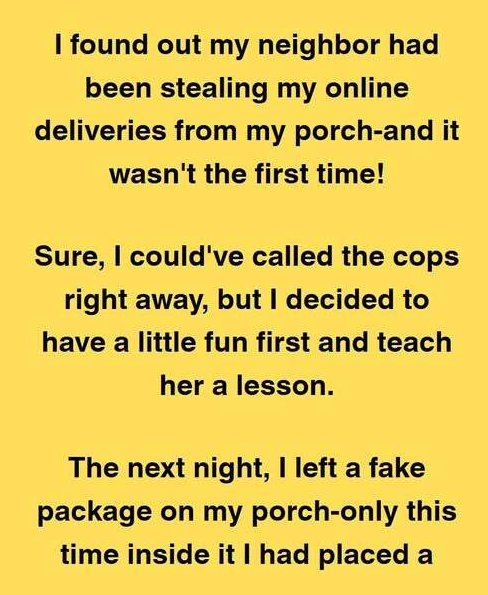That night, I went through all my emails, comparing delivery confirmations with what I had actually received. Three pairs of shoes, a phone charger, a winter coat—gone. Then I checked my credit card and found refunds I never requested.
It clicked. Darlene had been intercepting my packages and returning them, pretending she had purchased them.
I felt sick.
I wanted to confront her right then, scream in her face. But something in me held back. Maybe I could catch her in the act—get undeniable proof and finally make her face the consequences.
So, I ordered a high-end tablet online and requested that it require a signature. Then I called the delivery service and asked them to leave it on the porch anyway. Risky, yes—but necessary.
Once the box arrived, I set up my phone on a hidden tripod behind the potted hydrangeas. Hours passed slowly. Just when I was about to give up, I spotted her white sandals at the edge of the camera frame.
She glanced around, then casually picked up the box.
Gotcha.
I walked out before she could leave. “Looking for something?” I asked, keeping my tone calm.
She froze, clutching the box. “I was just… making sure no one else took it.”
“Darlene, I have you on video. And I know about the returns.”
She went pale and sank onto my porch steps. “Please… don’t call the police.”
A swirl of emotions hit me—vindication, shock, and oddly, pity. I had every right to press charges. But as I looked at her trembling hands and watery eyes, I wondered: how had it come to this?
She confessed everything. Her husband, Preston, had left her six months ago. She was drowning in debt, behind on her mortgage, terrified of losing the home she’d lived in for two decades.
What started as desperation became a routine. The money from returning my packages kept her afloat.
I couldn’t believe it. The same woman who always boasted about luxury cruises and designer handbags was barely surviving.
She begged me to let her make things right.
I told her I needed time to think. That night, I hardly slept. I kept replaying it all—the barking box, the cupcakes, her breakdown. Part of me felt triumphant. A bigger part felt hollow.
The next morning, I knocked on her door. She looked like she hadn’t slept either—eyes swollen, hair unkempt.
“I don’t want to ruin your life,” I said quietly. “But this can’t go on.”
She nodded, gripping a mug like it was her last thread of stability. “I know. I’m so sorry.”
I offered her a deal: repay me for everything she’d taken, and I wouldn’t go to the police. But there was one condition—she had to volunteer every weekend for six months at the local shelter, helping people who were truly in need.
Tears rolled down her face. She agreed.
A week later, she gave me her first payment. It wasn’t much—but it was a beginning. That Saturday, I saw her at the shelter, sorting clothes with quiet focus.
And something unexpected began to happen.
During our shifts together, we started talking. She told me stories of growing up here, how her family lost their farm when she was twelve. I shared my own fears—losing my job, struggling to stay afloat.
I realized we weren’t so different. Both of us were afraid of losing everything.
Slowly, a friendship grew.
She helped me repair my backyard fence. I helped her write a resume and apply for a job at the bookstore downtown. She got the position—and for the first time in months, I saw her genuinely smile.
Weeks passed. Darlene continued her repayments. I could hardly believe this was the same woman who used to sneak onto my porch at night.
One Saturday, we hosted a joint garage sale to declutter and raise funds for the shelter. Neighbors came by, curious about our new alliance.
Of course, some whispered. But I didn’t care. I was proud of what we’d become.
A year later, I stood beside Darlene as she received a volunteer award from the city. Her speech was honest and moving. She admitted she had made serious mistakes—without naming names—and spoke about how easy it is to lose your way when you’re desperate.
And that’s when I truly understood: everyone makes poor choices sometimes. But not everyone is given the chance to make things right.
Today, Darlene and I laugh about the barking box incident. We share dinner once a month. She even helped me design a tiny free library for our block.
Sometimes I wonder what might’ve happened if I had called the police that first night. Would she have sunk deeper? Would I have lost the chance to gain one of the most unlikely but meaningful friendships of my life?
I learned that mercy can be just as powerful as justice.
We never truly know what battles people are fighting behind closed doors. And when we choose compassion over punishment, we give others the chance to heal—and ourselves the chance to grow.
So if someone ever wrongs you, pause and ask yourself: will punishing them truly help, or could forgiveness change both your lives?
Because the biggest lesson Darlene taught me is this:
Sometimes, the best way to catch a thief… is with kindness.
If this story moved you or made you reflect, share it with your friends. Someone out there may need to hear that everyone deserves a second chance.
